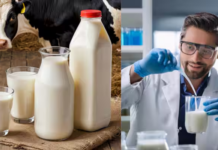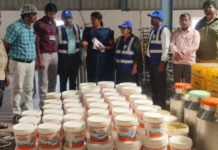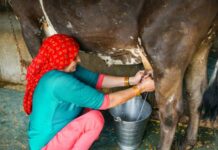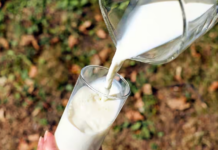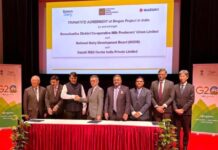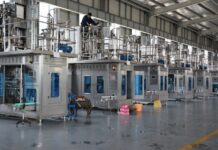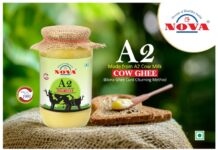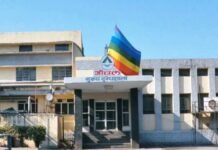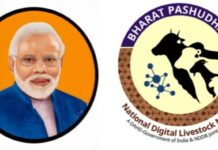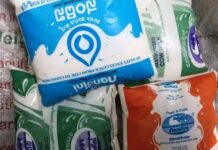New Delhi, January 21, 2021: Shraddha Dhawan’s family never had more than six buffaloes in their house. In fact, the 21-year-old, a native of Nighoj village (located about 60 km from Ahmednagar), recalls that at one point in time, in 1998, her family was left with only one buffalo.
At the time, her father, Satyavan, mainly traded buffaloes. Delivering milk was difficult for him, as he was differently-abled, and had a few physical limitations. Things changed when, in 2011, he gave her the responsibility of milking the buffaloes and then selling the milk. “My father could not ride a bike. My brother was too young to take on any responsibilities. So I took on the role at the age of 11, although I found it quite strange, and even unique, because no girl in our village had undertaken such a role before,” she tells The Better India.
In the mornings, while Shraddha’s classmates were preparing to leave for school, she was riding her bike around the village to deliver milk to several dairy farms. While this responsibility was tough to juggle with her ongoing education, she didn’t shy away from it.
Today, Shraddha runs her father’s business from a two-storey building, with over 80 buffaloes. The giant cattle-shed is known to be the first of its kind in the entire district, due to its size and because a woman helms it. Her family’s financial situation has since improved as well — they earn Rs 6 lakh a month.
“When my father handed the responsibilities of the farm to me, the business began growing. As it picked up, more buffaloes became part of the family,” Shraddha says, adding that by 2013, she needed a motorcycle to ferry the bigger kettles of milk. “At that point, we had over a dozen buffaloes, and built a shed for them the same year,” she adds.
‘Never seen a girl riding a bike’
While giving her Class X boards in 2015, Shraddha was selling 150 litres of milk a day. “By 2016, we had about 45 buffaloes, and were running a steady business and earning Rs 3 lakh a month,” she says.
She recalls how, initially, she was embarrassed and felt awkward about carrying out the job. “I’d never seen, or even known of, a girl riding a bike to sell milk in my area. Some villagers felt proud and encouraged me. Their kind words were what helped me feel good about my work, and boosted my confidence,” she adds.
But a large number of cattle brought about additional challenges. Shraddha says that having a small number of animals earlier required less fodder, which she could procure from her own farm for free. But as food requirements of the cattle increased, the family needed to buy more. “Buying fodder affected the profits heavily. The prices increase during the summer, and decrease once supply becomes adequate. During shortage sometimes, we were left with only Rs 5,000-10,000 for monthly expenses,” she says.
Shraddha’s family only feeds organic fodder to their animals, which is sourced from neighbouring farms. She shed is cleaned twice a day, and all animals undergo regular health checks. “We add supplements to their food if there is a calcium deficiency or any other health concerns raised by the veterinary,” she says.
Filling the gaps
Shraddha had to learn how to milk the buffaloes. Before, it was her father who milked them, and also had a workforce in place to carry out the job. “But when the helpers went on leave, the entire responsibility came onto me. My brother, Kartik, took care of cleaning and feeding the buffaloes, while I would milk them and make trips to sell the product. Even now, I milk 20 buffaloes every day,” she says.
With the 80 buffaloes on their farm, the family sells about 450 litres of milk a day. “In 2019, we constructed a second floor to house the animals,” she says.
The road to success required precious knowledge, and Shraddha slowly learned how to fill the gaps in her business. “I needed to have a good understanding of the technicalities of fat ratio in the milk, the quality that needs to be maintained, and how to compensate the erratic workforce, while continuing my education,” she says.
The young entrepreneur tells The Better India that managing a farm single-handedly also affected her academic decisions. Shraddha decided to pursue a graduate degree in Physics in her village itself. This contradicted the usual trend of students moving to bigger cities for more opportunities. But she holds no regrets. “I don’t feel inferior or believe I lack any skills which are holding me back from succeeding. I have overcome all these fears,” she says.
She shares an instance of the same. “In 2017, a trader from Gujarat had come to sell his cattle, and I tagged along with my father. On our way back home, my father asked me which cattle should be preferred. As it turned out, both of us had chosen the same one. It was at that moment that I realised I’d gained a good amount of knowledge and experience from working on the field,” she says.
Shraddha acknowledges that had she shied away from these responsibilities, she would not have tasted the success she has today. “It would have been a shame if I’d refused the responsibility of helping my family run this business. But being shy and giving up were never an option for my father,” she says. Inspired by her grit and hard work, Kartik has also taken a cue from his elder sister, and is now pursuing a degree in dairy and animal husbandry according to the reports published in thebetterindia.com.
Shraddha graduated college in 2020, and is currently pursuing a masters’ degree in Physics. She also hosts online guest lectures on the subject for students.
She says she’s still too young to chalk out an entire plan for her future. “I don’t know what opportunities the dairy business will open for me and my family. My brother is pursuing a formal degree in the field, and we’re exploring options to enter the organic dairy byproduct sector,” she says.
Shraddha credits her family for all the success. “My mother and brother wholeheartedly supported this endeavour. And of course, none of it would have even started if my father hadn’t asked me to sell milk on a bike,” she smiles.



